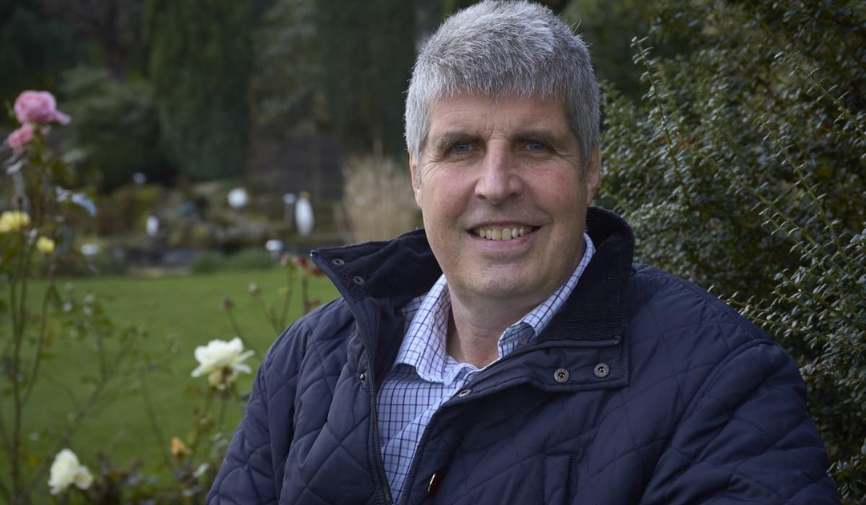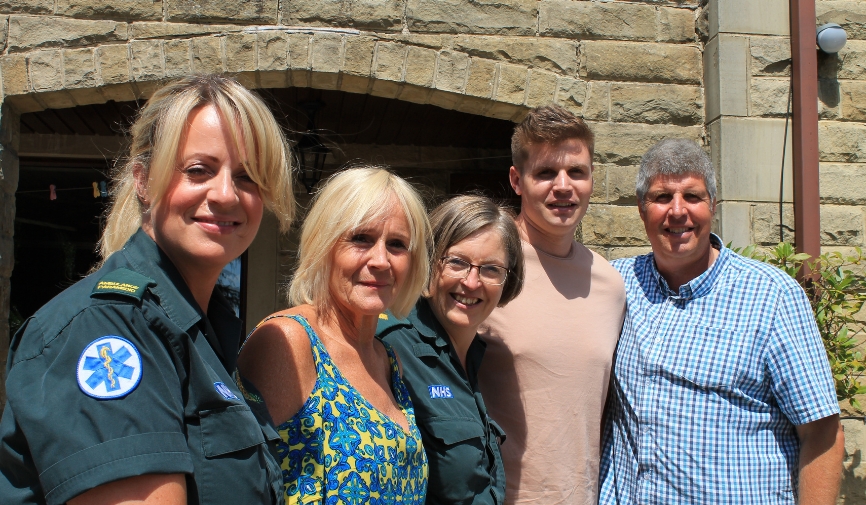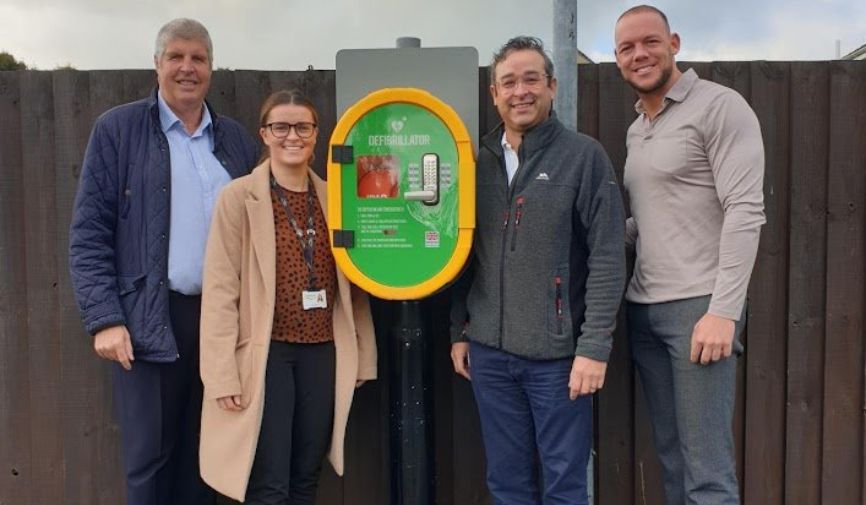Above: Neil Davidson
Image Source: Halifax Courier
On 31st July 2017, life for Yorkshireman Neil Davidson and his family took a turn that would redefine their futures. What began as a routine evening ended abruptly when Neil suffered a sudden cardiac arrest, rendering him unconscious.
Thanks to the efforts of Neil’s son, Oliver, in delivering lifesaving CPR and to the fantastic work conducted by NHS staff, Neil walked out of hospital less than six weeks later and returned home.
Recently, we spoke to Neil to find out more about his experience as a cardiac arrest survivor and the ways in which he has tirelessly dedicated himself to strengthening the chain of survival for others.
The Night of the Cardiac Arrest
Of the night in question, Neil remembers very little. “I went to bed that night normally,” he said. “I was planning to get up at six in the morning to take my son Oliver to the airport.” Oliver lives in Australia and was visiting Neil at the time.
At around three o’clock in the morning, Neil experienced cardiac arrest. Fortunately, Oliver had previously received CPR training and acted with lifesaving judgment and decisiveness. He began to deliver CPR to Neil.
“Oliver’s told me since that he thought that if he’d stopped, I’d have died,” Neil told us. “The adrenaline just kicked in. My wife says that he was physically sweating from the effort of giving everything he had, knowing that my life depended on it.”
Coming to Terms With It
In a way, the events of 31st July passed Neil by. He wasn’t conscious during the cardiac arrest and said: “As far as I was concerned, I went to bed as normal and woke up a month later from an induced coma.”
While hospital staff woke him up once or twice to conduct checks, Neil has only fleeting memories of Oliver and his wife trying to talk to and reassure him.
Above: Neil with his wife, son Oliver, and the paramedic team that arrived on the scene during his cardiac arrest.
While Neil was in a coma, he contracted pneumonia.
This, combined with a high temperature, meant that surgery could constitute a significant risk to Neil’s health. Conversations between Neil’s family and hospital staff eventually resulted in Neil undergoing an operation in which a surgeon changed the mitral valve in Neil’s heart, which had prolapsed and caused the cardiac arrest.
“I had some really low moments.”
“Once they decided to pull me out of the coma, it took me three or four days to fully come around,” said Neil. “At that point, I had no idea what a cardiac arrest was. I just woke up feeling that my chest was sore and was told I’d had major heart surgery.”
When Neil came around, he was unable to speak due to a tracheotomy and couldn’t walk due to muscle wastage, having been in a coma for several weeks. As a result, Neil experienced some low moments, even contemplating taking his own life.
“I had a great nurse who helped me through it,” Neil told us. “He reassured me that he’d seen it before and that it would pass in a few days, and I’d start to recover.”
After weeks of physio and medical support, Neil was able to return home. “Six weeks later, I was starting to get back to normal,” he said. “The cardiology team came to see me, but I was largely okay – I just needed to get my strength back.”
A Changed Perspective
“I’ve always been known as a character,” Neil told us. “I’m naturally a positive person. I’ve had a good life, and I’ve been very lucky.”
“I’m one of the five out of 100 who survived with no memory loss or brain damage. There are people who are out for much longer than me who have much worse effects. The older I get, the more I realise that having been down for 21 minutes and receiving four shocks, I’m lucky to be in such good health.”
Dedicated to Making a Difference
Since his recovery, Neil has focused his efforts on raising awareness and funds for CPR training and defibrillator knowledge and access. “I’m lucky that Oliver knew CPR. If he hadn’t, I’d not be here,” he said.
In the UK, only 8% of patients survive out-of-hospital cardiac arrests. Neil is passionate about seeing this number increase. To help achieve this, Neil has set up a community CPR group in his home area of Calderdale, West Yorkshire.
“The layperson is aware of CPR,” said Neil, “but being aware of it and being able to carry it out isn’t the same thing. That’s why we need to get more people trained.”
Neil has also dedicated a large amount of time to raising awareness surrounding the use of defibrillators; “people are afraid that, if they use them on someone, they’re going to get sued or injure somebody. We need to make sure that the average person is confident and capable of using defibrillators.”
Above: Neil with Jess Heald, Simon Ferris, and Mark Sharp displaying an AED provided by WEL Medical.
Image Source: Community Foundation for Calderdale
Each year, Neil raises between £15-20,000 to fund public access defibrillators, CPR training courses, and public awareness campaigns. He does this through charity events, fundraisers, and public speaking engagements in which he tirelessly bangs the drum for the crucial importance of Basic Life Support in our society.
The Impact This Has
“I know for sure that people I’ve funded the training for have saved lives,” Neil told us. “I still live in Calderdale, so seeing how that’s helped people in my community really brings home the impact it can have.”
The impact of Neil’s cardiac arrest has been hugely profound within his own family, too. Oliver, who’s quick thinking and determined, lifesaving CPR, now works on a cardiology ward in Brisbane, Australia. Here, he continues to save lives and strengthen the chain of survival.
Looking to the Future
Currently, Neil is focussing on what he calls ‘low-spot’ areas with poor cardiac arrest survival rates. He wants to see his borough of Calderdale being used as a beacon to inspire other parts of the country to improve their survival rates. “I’ve spoken about making CPR and defibrillation training part of our everyday lives,” he said. “It’s simple – the more people who have these skills, the more people survive cardiac arrests.”
Dedicated to Strengthening the Chain of Survival
Like Neil, we at WEL Medical are committed to strengthening the chain of survival and to saving lives. Whether it’s through raising awareness of tools like the BHF’s RevivR app or the crucial role of objective feedback in CPR training, we’re passionate about making sure that as many people are provided with the skills and equipment necessary to save a life.
For regular updates on CPR, AED, and other lifesaving news, follow our News page, or get in touch with us today to find out more.








